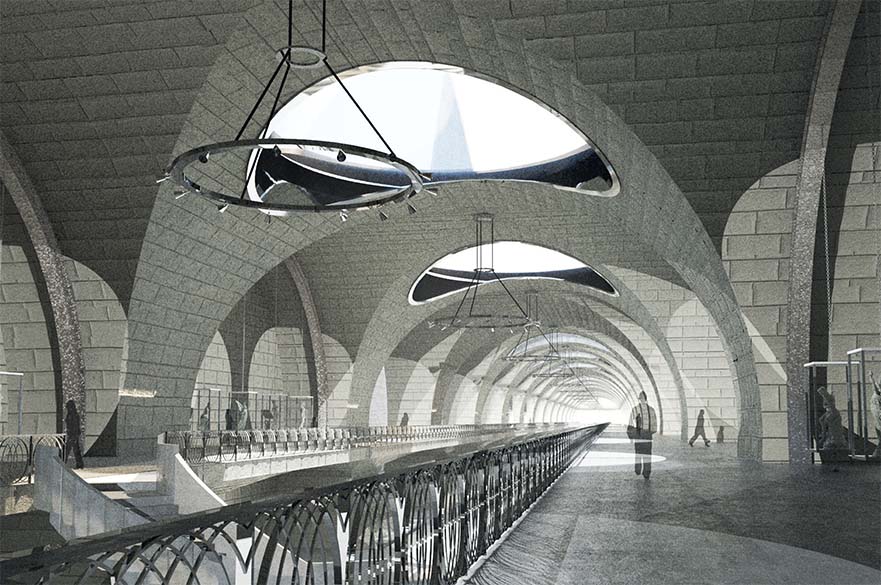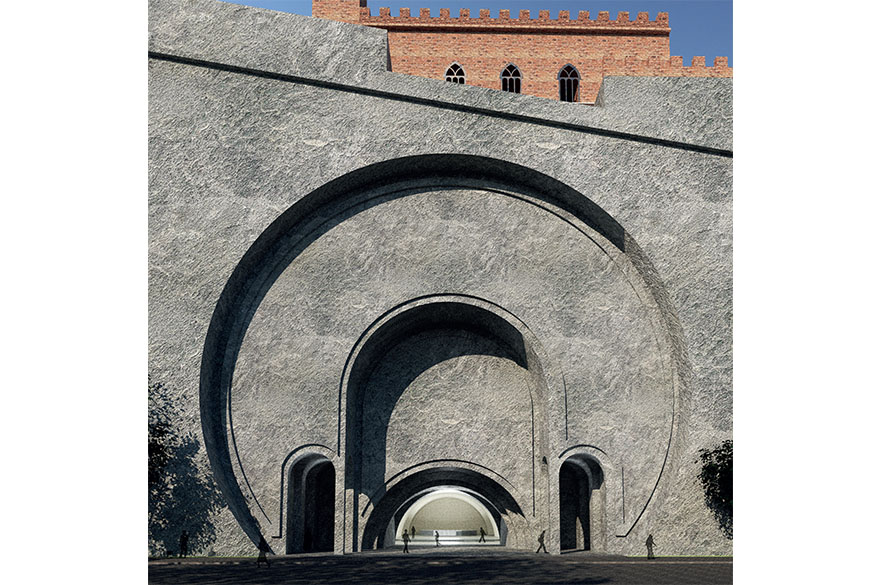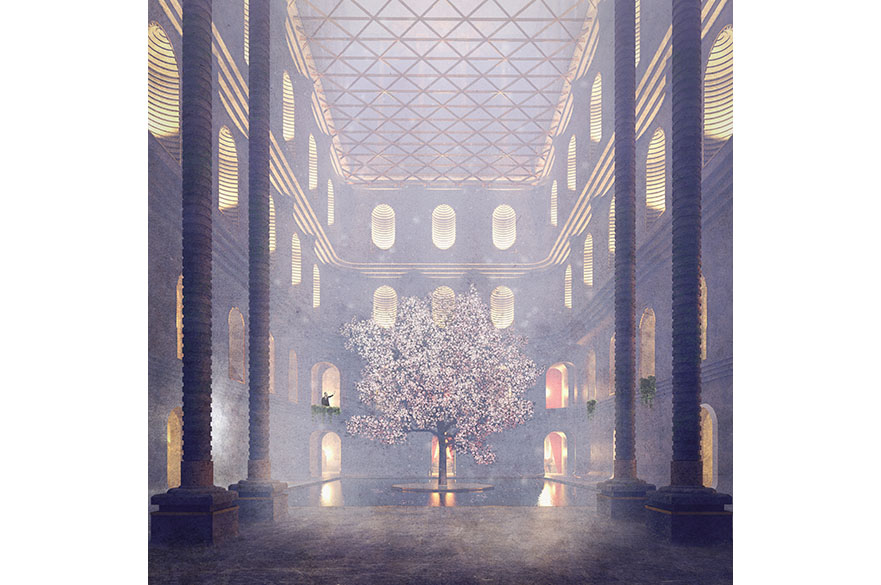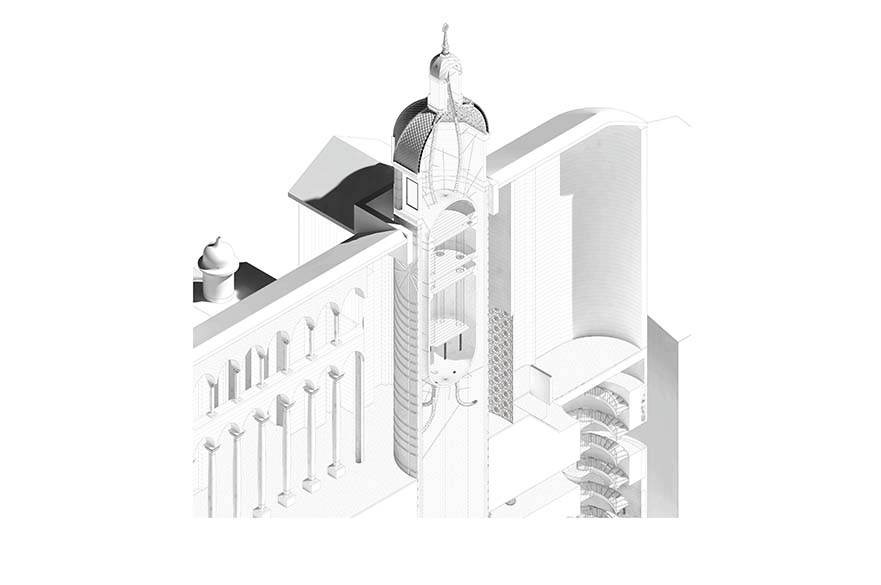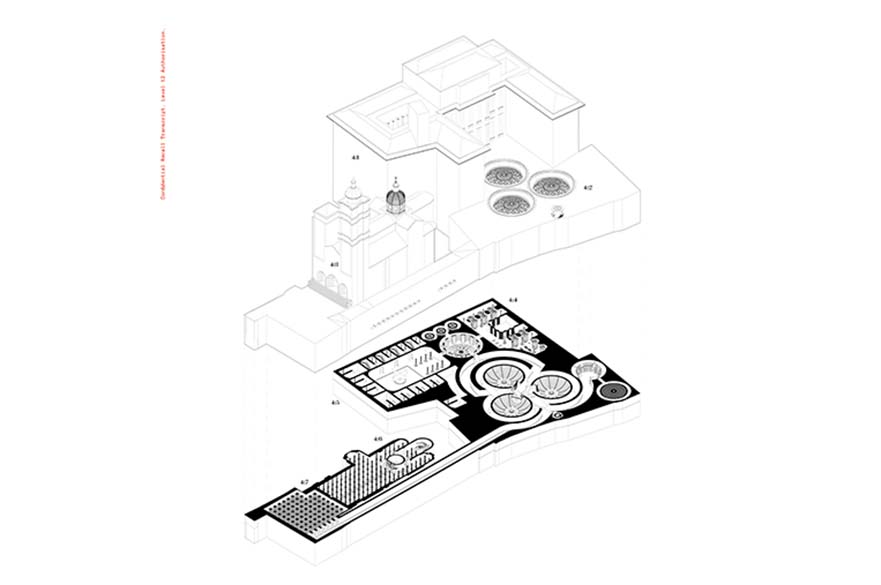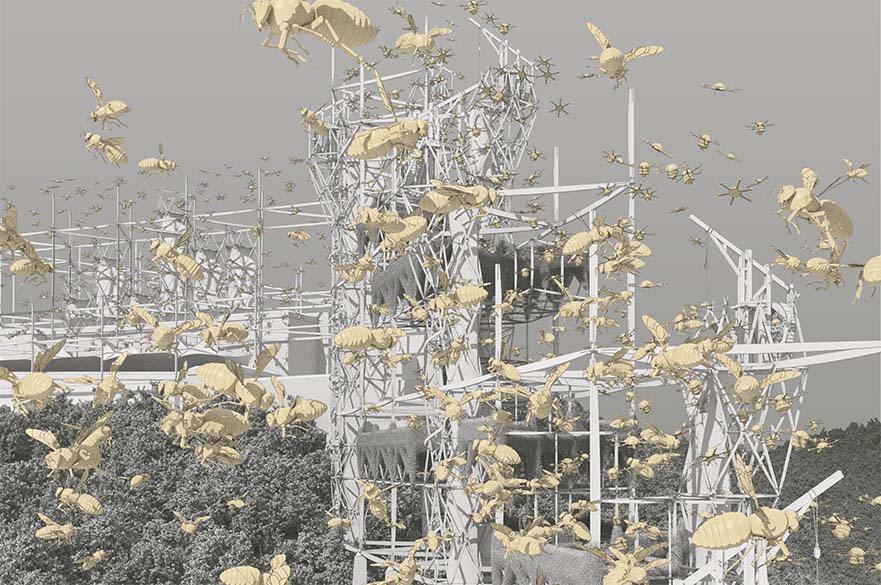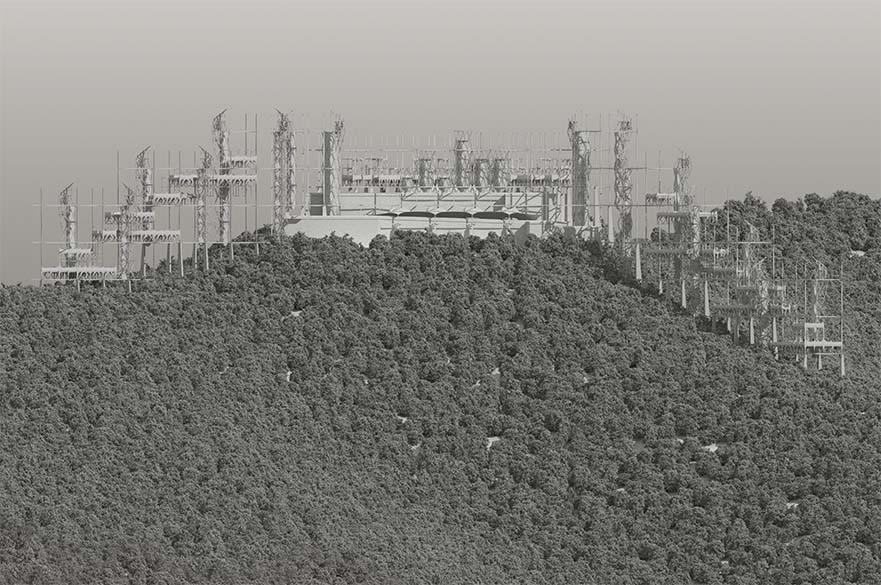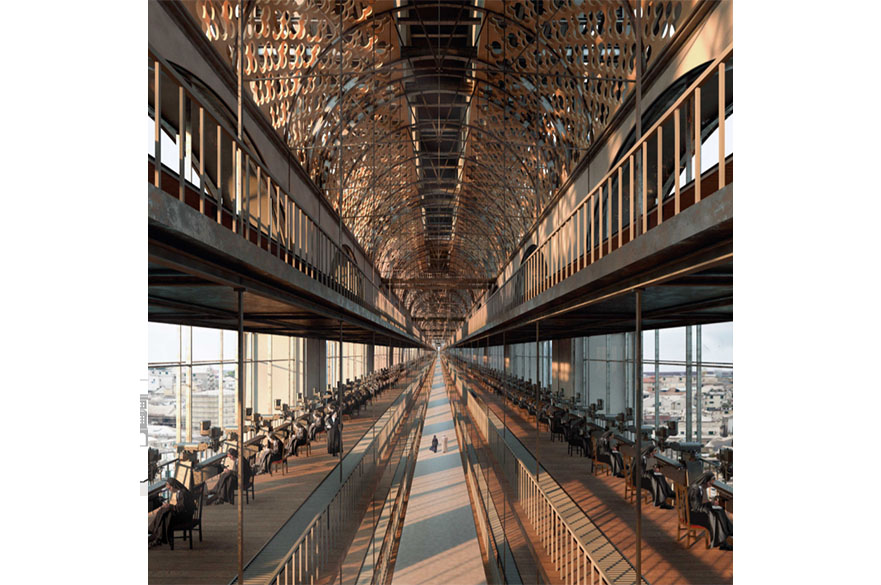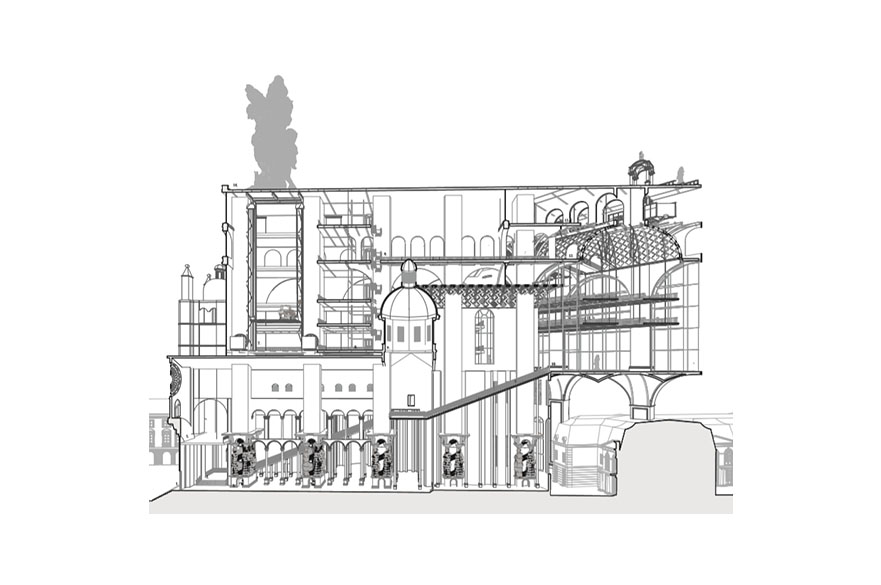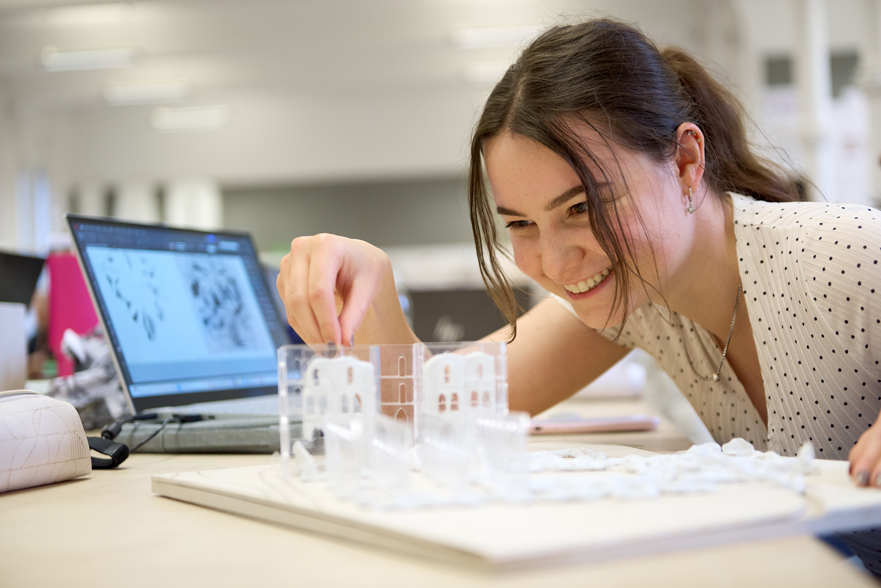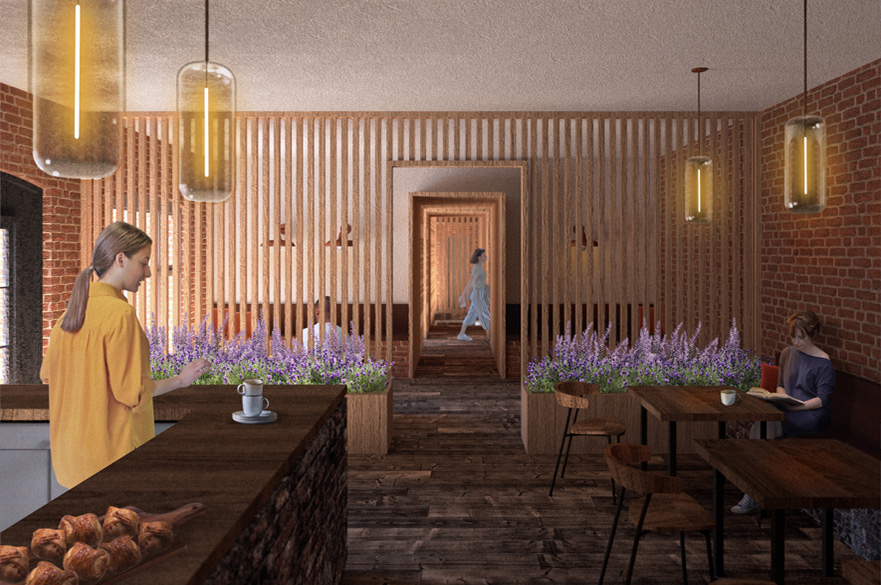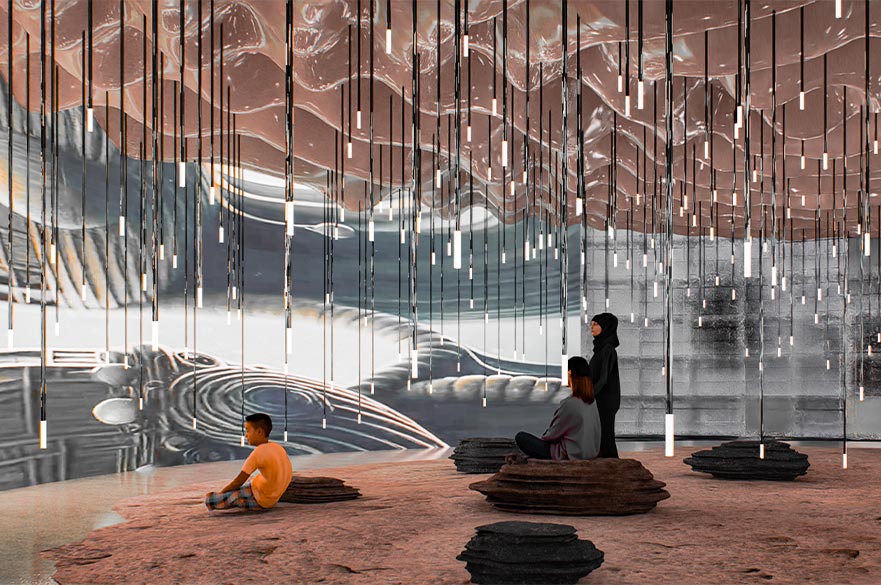This course is in Clearing
View entry requirements for more information
Architecture (ARB/RIBA Part 2) MArch
UCAS code: K648
About this course
MArch Architecture (ARB / RIBA Part 2) is a two-year full-time course that produces graduate architects who are fully equipped for a career in the architectural profession. It is designed to be the next step towards pursuing an accredited pathway to become a registered architect.
Fully accredited by the Royal Institute of British Architects (RIBA) and prescribed by the Architects Registration Board (ARB), the course fully satisfies the educational requirements for RIBA Part 2: the step you'll need before practical experience and the Part 3 qualification.
With focus on a global outlook, we set collaborative, industry-facing projects in local, national, and international contexts. The course framework enables you to advance your ability to research, analyse, self-appraise, think critically, work in a team and provide constructive feedback. With core legal, management and design leadership skills built into the course content, you’ll develop high-level skills needed for advanced industry practice.
Visit our Architecture Student Showcase, an online exhibition celebrating the work of our Year One and Year Two MArch students.
-
Architecture at NTU is ranked 1st in the UK for Teaching Quality (Times and Sunday Times Good University Guide, 2025).
-
Study in the heart of Nottingham — one of Europe’s top 25 student cities, and home to over 75,000 learners (QS Best Student Cities, 2025).
-
Showcase your work at our annual final year degree show, attended by architecture professionals, industry experts and potential employers.
-
2nd most sustainable university in the world (UI GreenMetric World University Rankings 2024).
What you’ll study
Our MArch Architecture course content is focused on four core strands:
- developing your design and communication skills
- extending your awareness and knowledge of the theory and socio-economic, historic and cultural factors affecting architectural design
- advancing your appreciation of technology and construction methods
- developing your knowledge of management, practise and law.
Together, this framework will build upon the skills and knowledge you have already gained, extending your ability to research, analyse, self-appraise, think critically, work in a team and provide constructive feedback.
Course structure
The course is formed of eight core modules. You’ll also be able to choose between two optional modules in Year Two, giving you the opportunity to further pursue an areas of interest.
The modules’ credit points are weighted based on the total time you can expect to spend studying the module content, both in terms of contact hours and non-contact hours.
Year One
- Architectural Theory and Research Methods (20 credits)
- Architectural Technology and Construction Methods (20 credits)
- Management, Practice and Law (20 credits)
- Vertical Studio I (20 credits)
- Intervening in the City (40 credits)
Year Two
- Dissertation/Research Project (20 credits)
- Vertical Studio II (20 credits)
- Design Thesis (60 credits)
- Heritage and Conservation (20 credits)
- Digital Design (20 credits)
Architectural Theory and Research Methods
- Supported by lectures and student-led seminars, this module will introduce you to a variety of current research in architecture and related areas, and discuss their relevance in relation to design and present day architectural thinking.
- You’ll look at key issues including the influence of history and theory in spatial, social, cultural and technological aspects of architecture; theories of urban design, cities past and present and the influence of fine art; epistemological and philosophical trajectories underpinning architectural research; and, humanities-based inquiry and the role of technology.
- By considering relevant methodologies, conducting literature reviews and establishing research questions, you’ll develop and extend your methods of analysis and interpretation in architectural thinking an design.
Architectural Technology and Construction Methods
- Studied over the course of Year One, this module will equip you with wide-ranging knowledge of sustainability, environmental, technological, and constructional aspects of architectural practice and thinking. It addresses issues of construction, technology, fire and life safety design environmental science, materials, components and systems, and the environmental strategies including the impact of specification choices and procurement.
- You’ll be introduced to innovative and emergent technologies in architecture, and their relevance to design thinking. You’ll consider issues relating to innovative structures and structural form, energy use in buildings and sustainable and low-carbon construction procurement and the selection of appropriate materials.
- Where possible, you’ll visit live projects and sites to gain first-hand experience of the issues involved.
Management, Practice and Law
- This module addresses professional issues relating to the architectural and construction industry, including the architect’s role in the process of procurement, building production and compliance with legislation.
- The purpose of the module is to strengthen your experience from your Part 1 qualification and from your time in industry.
- You’ll explore issues of ethics, health and safety, codes of conduct, legal rights and responsibilities and environmental sustainability, as well as looking at areas of business strategy, marketing, and practice. You’ll also consider legal responsibilities including briefing, contracts, negotiation, time and fee management, procurement options, warranties, and post-occupancy evaluation.
Vertical Studio I
- The Vertical Studio module is shared with Year Two MArch Architecture students, creating a cohesive studio environment and encouraging peer-to-peer mentorship and support.
- Working individually or as part of a small group, you will explore a complex technical condition with a focus on the relationship between context, structure, material, environment and users. You’ll apply relevant constructional, material and technological strategies, with knowledge supported and extended through other non-design modules studied, to develop a considered architectural response of appropriate complexity, producing visual, graphic and physical representations of your proposals.
- You’ll communicate your concepts creatively, and learn to interrogate and critically appraise your own proposals, to a professional level.
Intervening in the City
- This design studio module is the key design project of Year One and is based on the principle of ‘thinking and making.’
- The project links interrelated elements relevant to architectural study and practice, and draws from across your first year of study. It introduces the complexity of architecture and its operation within the urban context.
- The project will be based on a thorough analysis of a chosen urban area. Working both individually and in small groups, you’ll develop a network of infrastructure (urban strategy), establishing your own brief, and developing scheme and detailed designs. You’ll consistency address relevant theoretical issues in your design and explore technology and materiality through detailed tectonic resolution.
Dissertation/Research Project
- This module serves as the culmination of the research methods module in Year One, giving you the opportunity to demonstrate your advanced research methodology, analytical and interpretation skills.
- You’ll produce an extended piece of academic research in an appropriate area related to your field of study; the format can either be a written dissertation, or a research project combining both written content and empirical work, such as laboratory-based experimentation or field work.
- Student-led research is at the heart of this module, which will be supported by group and individual tutorials with allocated supervisors.
Vertical Studio II
- The Vertical Studio module in Year Two will be delivered alongside Year One students, however you will now be expected to take a mentor and leadership role, supervised by a visiting practitioner or academic.
- You will have grown and matured in your design approaches, therefore this module offers the opportunity to demonstrate your ability and widen your understanding of the scope and challenge of current and emerging architectural issues.
- As in the Vertical Studio module in Year One, you will explore a complex technical condition, with a focus on the relationship between context, structure, material, environment and users. You will develop your own personal leadership and design mentorship skills in your work with Year One MArch Architecture students.
Design Thesis
- This studio project module forms the key design module in Year Two. Your design thesis is the culmination of design work in your MArch course, and is a demonstration of: advanced architectural design ability, and the ability to apply technological, material, environmental and sustainability knowledge; the use of relevant legislations, regulations and policies (including fire and safety design); and a clear understanding of contemporary architectural debates
- You will develop and execute an extensive, complex design project, showing originality in the application of subject knowledge, exploring themes including architecture, urban design, sustainability and technology.
Optional modules
In Year Two, you will have the opportunity to choose between two optional modules. Both of these choices offer a chance for you to develop cross-disciplinary appreciation of the professional interrelationships, ways of working and areas of responsibility in disciplines allied to the architectural profession.
Heritage and Conservation
- This module focuses on architectural history and conservation, and heritage philosophy and practice.
- You’ll focus on historic environments in the UK and consider selective international examples, learning how to identify different architectural styles, appraise culturally significant buildings, and manage proposed uses and associated interventions in line with current international approaches (e.g. UNESCO and ICOMOS international charters and debates).
Digital Design
- This module provides experience of using advanced digital design techniques and methodologies to support the architectural/urban design process. It aims to develop conceptual, methodological and technical skills in digital architectural design.
- The module is linked to the Design Thesis module, and you will be able to choose from three different options including parametric modelling, mixed environment and architectural narrative and building information modelling.
We regularly review and update our course content based on student and employer feedback, ensuring that all of our courses remain current and relevant. This may result in changes to module content or module availability in future years.
Don’t just take our word for it, hear from our students themselves
Student Work
Video Gallery
How you're taught
You’ll learn through a mix of:
- Projects - the course is delivered predominantly through project-based learning.
- Tutorials - this includes group and one-to-one tutorials, seminars and site visits, along with regular critiques or reviews, replicating a professional architectural practice. Review sessions usually include an exhibition of your work, accompanied by a presentation, and followed by a panel discussion.
- Workshops - you’ll utilise our model making workshop to produce large and small scale prototypes, to test your design concepts.
- Lectures - learning key theories.
Outside of timetabled sessions you will need to undertake self-directed independent study. This will include preparing for lectures, researching, completing coursework, developing a portfolio, and directed reading to expand your knowledge.
Study trips
Field trips and study visits are an important part of your learning. Trips may include site visits and visits to practices, museums, exhibitions and events. Where a trip is mandatory it will be aligned to your modules and inform project work, and substantive costs – including travel and accommodation – will be paid for by the school.
Optional trips may also be organised which can provide additional opportunities to enhance your knowledge and experience. Optional trips will incur an additional cost of approximately £500 for participating students.
A valid passport and any associated visas will be required for trips outside of the UK.
How you're assessed
People excel in different ways, and we want everybody to have the best possible chance of success. You will be assessed through:
- coursework, including individual and group projects, essays, case studies, research projects and live briefs
- portfolio, including exhibition pieces
- practical assessments, such as individual presentations of project work
Careers and employability
Our course is validated by RIBA to provide exemption from Part Two examinations and is prescribed by the Architects Registration Board (ARB) for the purpose of entry onto the UK Register of Architects.
This course is suitable for students wishing to fulfil the educational requirements of the RIBA Part 2, before moving on to Stage 2 practical experience.
Where do MArch Architecture graduates from NTU work?
After completion of this course, the majority of graduates seek employment in architectural practises to work towards their Part 3 examinations, in preparation for an eventual full RIBA/ARB professional qualification.
Our MArch Architecture course has been designed to maximise the employability prospects of our graduates, equipping you with professional skills as well as enhancing and developing your design skills, technical knowledge and ability to communicate your ideas.
Graduates have gone on to hold various architectural roles in companies such as Davidsons Development, Marchini Curran Associates and HKR Architects amongst others, whilst working towards their Part Three examinations.
Our Employability team
Our expert Employability team will work closely with you at every stage of your career planning, providing personal support and advice. You can benefit from this service at any time during your studies, and for up to three years after completing your course.
Throughout the year, our Employability team runs a series of events specifically for students studying in the School of Architecture, Design and the Built Environment. This includes the Property, Design and Construction Fair where employers from all over the UK return each year to recruit our students to graduate roles.
Re:search Re:imagined
To us, research is about more than writing papers and proposing new ideas. By daring to think differently, we’re disrupting the research landscape and finding the answers to the questions that really matter. From sustainable cities to smart and virtual heritage technologies, we’re inspiring the brightest minds to rise up and find solutions to some of the most significant global challenges facing society.
Find out more: ntu.ac.uk/research
NTU Enterprise
You'll also have the opportunity to turn your ideas into a viable business with help from NTU Enterprise, NTU's purpose-built Centre for Entrepreneurship and Enterprise, a support centre to help students create, develop and grow their own businesses.
What our students are doing now
NTU students connect with 120+ employers at the annual Built Environment Careers Fair
Employers across the various built environment sectors came to Nottingham Trent University (NTU) to showcase their placement and graduate opportunities to students across the School of Architecture, Design and the Built Environment (ADBE).
ADBE graduate wins the CIAT National Student Award for Excellence in Architectural Technology
ADBE invites students to be inspired by Women in the Built Environment
Campus and facilities
Historic setting, modern practice
You'll study in dedicated studio spaces based in our Grade II* listed Gothic Revival Style Arkwright building in the heart of Nottingham. The spaces are equipped with computers, display screens, visualisation and projection facilities, pinboards, A3 printer, A2 scanner, A1 plotter and infinity curve with photography lamps.
Our studio is a perfect space for you to advance. You'll work on various programmes including Adobe Photoshop and InDesign, AutoCAD, Sketchup, REVIT and VRay to complete your work.
Architecture students also have access to a model-making workshop equipped with power- and hand-tools, bandsaws, sanders, heliodon, spray-booth etc, with full-time technical assistance available, for building large- and small-scale prototypes in order to test and present your design ideas.
Entry requirements
This course is in Clearing
Looking for a place in Clearing? We are accepting application and would love to hear from you!
UK students
This course is in Clearing
Looking for a place in Clearing? We are accepting applications and would love to hear from you!
To discuss our entry requirements and see what we can offer you, call us now on +44 (0)115 848 6000. Alternatively, if you already have your qualifications, apply online via our Clearing Application form.
Preparing for results day? Beat the queue and sign up for NTU Priority for up-to-date information about all things Clearing. You’ll get an offer ahead of Clearing, subject to you achieving the required grades on results day.
Academic entry requirements: Usual requirement for entry on to this course is a 2:2 honours degree in a RIBA/ARB Part 1-accredited course.
In some cases, we accept applicants without an RIBA/ARB Part 1 who can provide an exceptional portfolio, supported by a number of years' experience in architectural practice.
Other requirements: A digital portfolio and interview. If your portfolio is accepted, you'll be asked to interview with the academic team. Your interview will be held via telephone or Microsoft Teams. Your interview will help us to decide whether we feel you are suitable for the course and will help you to decide if this is the right course for you.
Additional requirements for UK students
Route to becoming a Registered Architect in the UK
The Architects Registration Board (ARB) is the independent statutory regulator of architects in the UK, and is also the UK’s Competent Authority for Architects. In order to call yourself an ‘architect’ in the UK you must be registered with the ARB.
In order to register in the UK, you typically need to hold the following:
- An ARB prescribed UK qualification at Part 1;
- An ARB prescribed UK qualification at Part 2; and
- An ARB prescribed UK qualification at Part 3, including 24 months practical training experience.
This means that even if you complete and pass the prescribed Part 2 qualification that you are embarking on, you will still need to hold an ARB prescribed qualification at Part 1 level (plus an ARB prescribed qualification at Part Three level together with the required period of practical training), before you can be admitted to the ARB Register.
If you already hold a first degree which covers the same subjects as a UK Part 1 qualification but which is not prescribed by the ARB, you may be eligible for ARB’s Prescribed Examination, through which you can gain equivalence to the UK Part 1, which can then be used for purpose of UK Registration.
You can check whether any qualifications you may already hold are recognised by ARB and at which level, and you can find more information about the ARB’s Prescribed Examinations and its requirements for registration via ARB’s website.
Contextual offers
If you don’t quite meet our entry requirements, we might be able to make you a lower offer based on a range of factors, including your background (such as where you live and the school or college you attended), your experiences and your individual circumstances (you may have been in care, for example). This is called a contextual offer, and we get data from UCAS to help make these decisions. We do this because we believe everyone with the potential to succeed at NTU should have the opportunity to do so, no matter what barriers you may face.
Other qualifications and experience
NTU welcomes applications from students with non-standard qualifications and learning backgrounds, either for year one entry or for advanced standing beyond the start of a course into year 2 or beyond.
We consider study and/or credit achieved from a similar course at another institution (otherwise known as credit transfer), vocational and professional qualifications, and broader work or life experience.
Our Recognition of Prior Learning and Credit Transfer Policy outlines the process and options available for this route. If you wish to apply via Recognition of Prior Learning, please contact the central Admissions and Enquiries Team who will be able to support you through the process.
Getting in touch
If you need more help or information, get in touch through our enquiry form.
International students
This course is in Clearing
Looking for a place in Clearing? We are accepting applications and would love to hear from you!
To discuss our entry requirements and see what we can offer you, call us now on +44 (0)115 848 6000. Alternatively, if you already have your qualifications, apply online via our Clearing Application form.
Preparing for results day? Beat the queue and sign up for NTU Priority for up-to-date information about all things Clearing. You’ll get an offer ahead of Clearing, subject to you achieving the required grades on results day.
Academic entry requirements: Usual requirement for entry on to this course is a 2:2 honours degree in a RIBA/ARB Part 1-accredited course. In some cases, we accept applicants without an RIBA/ARB Part 1 who can provide an exceptional portfolio, supported by a number of years' experience in architectural practice.
We accept equivalent qualifications from all over the world. Please check your international qualifications on our international entry requirements page.
Other requirements: A digital portfolio and interview. If your portfolio is accepted, you'll be asked to interview with the academic team. Your interview will be held via telephone or Microsoft Teams. Your interview will help us to decide whether we feel you are suitable for the course and will help you to decide if this is the right course for you.
English language requirements: See our English language requirements page for requirements for your subject and information on alternative tests and Pre-sessional English.
Additional requirements for international students
There are no additional requirements for this course.
Policies
We strive to make our admissions procedures as fair and clear as possible. To find out more about how we make offers, visit our admissions policies page.
